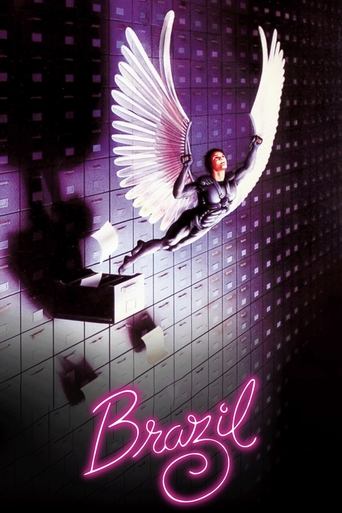Es sólo un estado mental.
"Brazil," a 1985 cinematic masterpiece produced by Embassy International Pictures, is a dystopian satire that brilliantly melds dark humor with a chilling vision of a bureaucratic future. Directed by Terry Gilliam, the film unfolds in a surreal world where technology reigns supreme, yet fails spectacularly at improving human life. The protagonist, Sam Lowry, portrayed by Jonathan Pryce, is a low-level government employee who dreams of escaping his mundane existence through fantastical daydreams. However, his life takes a dramatic turn when he becomes entangled in a bureaucratic nightmare following a clerical error, leading him on a quest to find the woman of his dreams amidst a backdrop of oppressive surveillance and societal decay. The film's aesthetic is a chaotic blend of retro-futurism and steampunk, creating a visually arresting environment that feels both nostalgic and unsettling. Gilliam's meticulous attention to detail is evident in the cluttered, labyrinthine sets that symbolize the overwhelming nature of the bureaucratic system. The soundtrack, featuring the haunting theme "Brazil," composed by Geoff Muldaur, perfectly complements the film's tone, enhancing its dreamlike quality and underscoring the protagonist's descent into madness. The ensemble cast, including Robert De Niro, Kim Greist, and Michael Palin, delivers compelling performances that add depth to the film's complex narrative. "Brazil" is not just a critique of totalitarianism and consumerism; it is a profound exploration of the human condition. Sam Lowry's journey from conformity to rebellion reflects the universal struggle for individuality and freedom in the face of oppressive systems. The film's dark humor serves as a coping mechanism for the characters, and by extension, the audience, as they navigate the absurdity of their reality. Gilliam's vision challenges viewers to question the nature of progress and the cost of convenience, making "Brazil" a timeless and thought-provoking work of art. In its bold narrative and striking visuals, "Brazil" stands as a testament to the power of cinema to provoke and inspire. The film's initial reception was mixed, with some critics praising its originality while others found its bleakness off-putting. However, over time, "Brazil" has garnered a cult following and is now widely regarded as a seminal work in the dystopian genre. Its enduring relevance lies in its ability to resonate with audiences who see echoes of its themes in their own societies, making it a poignant reminder of the importance of vigilance and resistance against the encroachment of authoritarianism.
Año1985
Presupuesto15000000$
Duración143 minuto
Ingresos9900000$
GénerosComediaCiencia ficción
Países de producciónUnited KingdomUnited States of America
